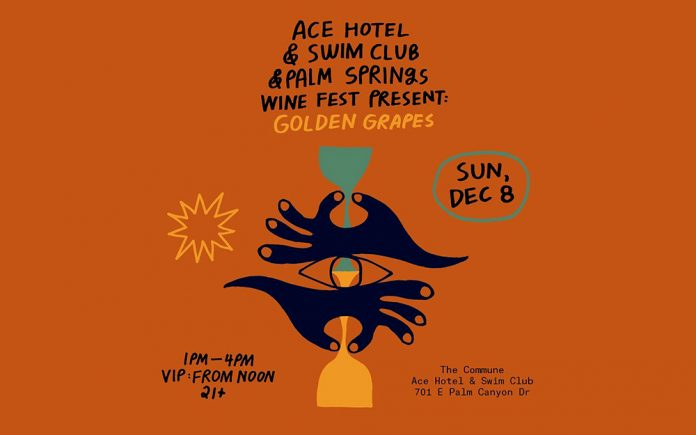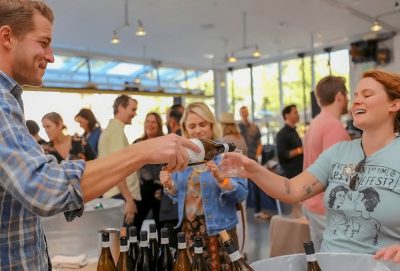
By Rick Riozza
The full name of this now annual wine celebration is the Golden Grapes Palm Springs Wine Festival. It is being held this week at the Ace Hotel Palm Springs on Sunday December 8th from 1-4pm. That’s the essential stuff you really need to know. And, we valley vino enthusiasts not only support this happy event, but we wish to cheer on the new guard of wine makers who are producing organic, biodynamic, or “natural” wines for our healthy consumption.
Quoting from the palmspringswineblog.com, “Over 50 participating wineries will be pouring their wines, talking about the process of wine-making and providing behind the scenes of California’s forward thinking viniculture and viticulture. This new guard of winemakers is making a radical shift in the wine industry in California, preserving varietals from the Sierra Foothills to Mendocino; wines that use biodynamic and organic farming practices. All of this with a poolside soundscape to boot.”
As I wrote last year, wine festival founder, Christine Soto, is the owner of the popular Dead or Alive wine bar, who continues to showcase smaller wine producers who make a great bottle of wine but often do not get the fanfare they deserve. Her savvy wine list always features a selection of wines that are “more natural and fresh.” She continues to comment “that the wines are made with love and reflect their dedication to California terroir.”
 This column for some time now has discussed the “organic” wine topics, and as well, covered particular folks who are producing and are in the business of distributing the “new” artisan wave of vino. Unfortunately, the terms of art in the business vs. consumers are still hazy for many.
This column for some time now has discussed the “organic” wine topics, and as well, covered particular folks who are producing and are in the business of distributing the “new” artisan wave of vino. Unfortunately, the terms of art in the business vs. consumers are still hazy for many.
Rachel Monroe, author of “Savage Appetites: Four True Stories of Women, Crime and Obsession, recently wrote: “To label a wine “organic” or “biodynamic” requires following a long list of rules and paying for certification; however, to call it “natural” is merely to make a general claim of virtue. ‘Stasis, purity, unchanging essence—these are the heart of the natural myth. Natural means the original version.’
“But turning grape juice into wine means intervening in the course of nature. What people mean when they declare a wine to be natural, then, depends on a constellation of factors: the soil, the grapes, irrigation or its absence, the harvest methods, the amount of sulfur, what machines were or were not involved—even, perhaps the winemaker’s personality and politics …There are many ways to be virtuous, or to fail at it.”
Lots of wine lovers use the more hip word “artisanal” in their reference, as the Europeans do, as opposed to the mega-wine producers out and about in the market today with their high-tech methods. Monroe again comments, “Artisanal wines are typically made with organic grapes, using no added yeast, no filtration, no chemical additives, no new oak barrels, and no mechanical manipulations. The wines were variously described as low-intervention, naked, or raw; the term that eventually stuck was “natural.”
When I’ve spoken to Christine Soto at her wine bar, it’s pretty clear that she sees the brave new world of wine as being either national brands or natural wines. It’s funny—as the wine steward at Ralphs Market, where we sell over one thousand national brand wines, I absolutely enjoy her comments, and, am thrilled with her endeavors at her bar and with the annual Palm Springs Wine Festival to promote the new wave of natural wine makers in California.
A list of the participating wineries at this week’s Golden Grapes wine fest can be found around town, www.deadoralivebar.com/events, and especially on the Ace Hotel website, www.acehotel.com/palmsprings/events. It’s one of the most exciting arrays of new and inventive winemakers ever to be convened! What a great opportunity to meet and chat with them while tasting their wines. I urge you wine folk to be a part of the a year event and experience the new wave in wine.
With over 50 wineries participating, who can pick the favorites! Below are some wineries and winemakers to look for:
Sandlands is the personal project of Tegan and Olivia Passalacqua. The line-up encompasses the forgotten classic California varieties, primarily grown in decomposed granite (sand), from regions and vineyards that have been farmed for many generations but have remained the outliers of California viticulture. Primarily head-trained, dry-farmed and own rooted, the vineyards harken back to California’s roots of exploration, wonder, and hard work.
Minus Tide is focused on making cool-climate, balanced wines that showcase the distinct, coastal, and rustic vineyards of Mendocino, California. Shrouded in towering old-growth redwood trees, this winegrowing region is influenced by the fog and cool air that drifts inland from the Pacific Ocean. Working with sustainable and organic vineyards, in the cellar, they use minimal intervention practices and currently produce Riesling, Chardonnay, Pinot Noir, Carignan, Malbec, and Syrah. Their goal is to make delicious wine that pairs well with food—high in acidity and low in alcohol.
Scar of the Sea strives to shift the pendulum to focus on what is in the glass. The most important part of our wines and cider is where they are grown; location, climate, and soils matter. These wines and ciders are crafted with minimal manipulation. All the vineyards and orchards are influenced by the sea, with maritime soils, and climates, producing wines and ciders that are unique to the Central Coast of California.
Jolie Laide is a one-man operation based in a Sebastopol winery where winemaker Scott Schultz makes only 500 cases of wine a year under his own label. The name Jolie-Laide translates loosely to “Pretty-Ugly”, a French term of endearment to describe something that is unconventionally beautiful. Scott makes some of the most unique and highly sought-after wines in California that are true to their name.
Golden Grapes Wine Fest: Sips, small bites & music—General admission $85. $99 VIP (which includes early access to the festival at 12 noon and a free bottle of wine). Cheers! See you there!











































